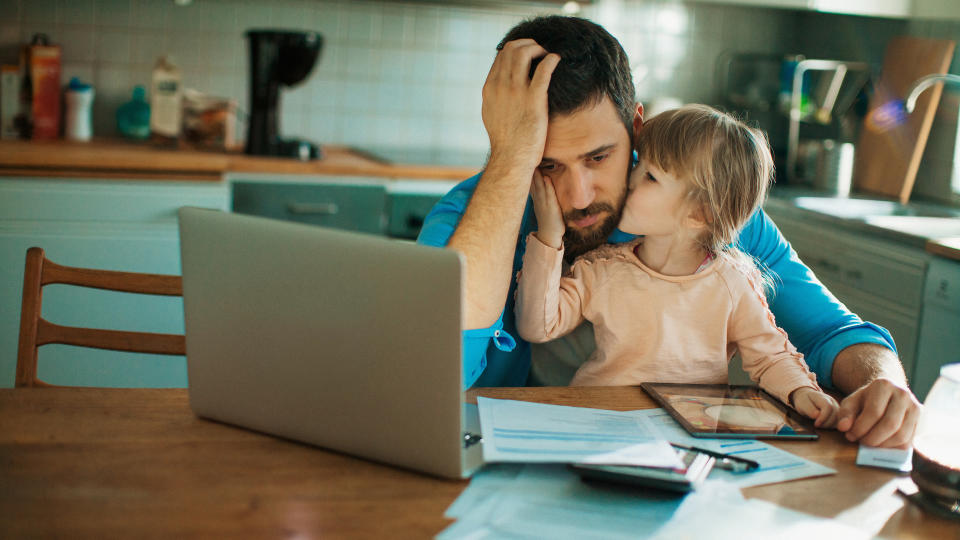7 Signs You May Be at High Risk of Fraud, According to Experts

If you think you couldn’t be a victim of fraud — particularly consumer fraud, in which your financial or personal data is hacked or stolen — think again. The most common types of consumer fraud, according to Investopedia, include credit card and debit card fraud, identity theft, mortgage scams, fake debt collectors and false charities.
The Future of Finances: Gen Z & How They Relate to Money
Explore: Your Biggest Money Etiquette Questions Answered
Scammers have gotten very good at creating emails that look like they come from your own legitimate accounts, such as PayPal or Amazon. If you have almost any digital account, or form of payment, you are at risk for fraud.
However, you may be at higher risk than others if any of the following apply to you. Be aware, and be careful!
You Reuse the Same Password
A common habit of busy people is to use the same password for multiple accounts. According to George Pennington, a business and finance expert with the FinancesMatter blog, “This is a big no-no when it comes to passwords. You should always have different passwords for different accounts. That way, if one account is compromised, your other accounts will still be safe.”
Ellie Gillard, a content marketer at TryHackMe, a cyber security training platform, shared that in a recent study carried out by Microsoft, they found that “44 million users reuse their password across numerous accounts. With 95% of cyber security breaches estimated to be caused by human error, taking appropriate steps to gain cyber security awareness is vital.”
Your Passwords Are Weak
Strong passwords are important for protecting your accounts from fraud. Make sure your passwords are at least eight characters long and include a mix of uppercase and lowercase letters, numbers and symbols.
Take Our Poll: What’s the Table Time Limit on a $400 Restaurant Meal?
You Don’t Use Two-Factor Authentication
Two-factor authentication might seem like a hassle, making you take an extra step to prove it’s really you when making a transaction or logging into an account. However, Pennington pointed out, “[It] is an extra layer of security that can help protect you from fraud. If a website offers two-factor authentication, you should definitely enable it.”
You Click on Unverified Links
Pennington also warned that you’re at greater risk of fraud if you click on links in emails without verifying them first. “This is a dangerous habit that can lead to fraud. Always make sure you know where a link is going before you click on it.”
You Provide Personal Information to Unsecure Sites
When you share personal information online, you should make sure the website is secure, Pennington urged. “You can tell if a website is secure if it has HTTPS in the address bar. If you see this, it means the website is using a secure connection.” If not, you’re using it at your own peril.
You Don’t Check Your Accounts Frequently
Vanessa Perry, a finance and credit expert with ImpeccableCreditServices, urged consumers to “make sure that you are often checking and managing your accounts frequently in order to easily notice fraud if it is occurring. If you are shopping online make sure it is a credible shop. Make sure it has reviews and is a legitimate business.
You Think Fraud Is Only a Virtual Phenomenon
Perry clarified that fraud can happen virtually, or in person. “If you are shopping in person make sure there are no additional prompts or scans to your card during the transaction process.”
She said credit cards with a chip are easier to steal information from, so beware. “Also if you think you have a lost card even if it is misplaced make sure to turn it off and call it in as soon as possible just in case it is in fact stolen. It is better to be safe than sorry.”
Other Signs of Fraud
Even if you’re doing everything right, also keep your eyes peeled for a few other signs of fraud, according to Danny Marshall, at Mortgage Rate Guru.
These include unusual charges on your credit report; suspicious activity on a credit or debt card or in your bank account; and random credit inquiries asking you for personal info online or over the phone. And of course, never ever send money overseas to anyone you don’t know, even if they claim to be royalty.
When in Doubt, Freeze Your Credit
Zachary Kitchen, a cybersecurity expert with Digital Crisis, offers a helpful tip if fraud has happened to you. “Freezing your credit with each of the three credit bureaus — Equifax, Experian and TransUnion — ensures that no one can open a financial account without your knowledge. The freeze prohibits your credit from being pulled and makes it impossible for a loan or credit card to be opened in your name without the freeze first being lifted.”
More From GOBankingRates
This article originally appeared on GOBankingRates.com: 7 Signs You May Be at High Risk of Fraud, According to Experts

 Yahoo Finance
Yahoo Finance 